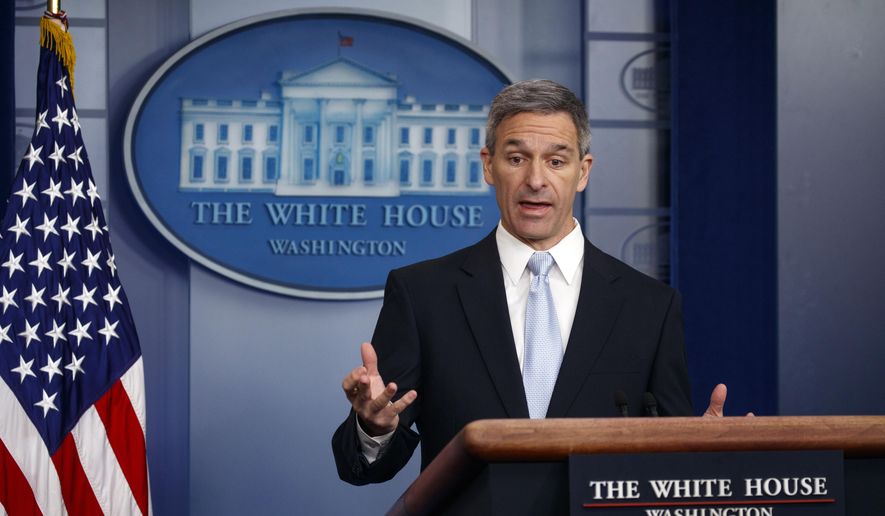The government’s citizenship chief said Wednesday that there’s no need to amend the Constitution to stop automatic citizenship being granted to immigrants who are in the U.S. illegally, though he said he’s not sure whether President Trump could act alone or if it would take a law from Congress.
Ken Cuccinelli, the acting director of U.S. Citizenship and Immigration Services, said that second issue still needs study, but he said he has a firm belief that the Constitution allows it.
“I do not think you need an amendment to the Constitution. I think the question is do you need congressional action or can the executive act,” said Mr. Cuccinelli, a former attorney general in Virginia who’s seen as a front-runner to be named the next acting secretary at Homeland Security.
He spoke to reporters at a breakfast hosted by the Christian Science Monitor, where he defended his agency’s role in Mr. Trump’s immigration plans.
Mr. Cuccinelli pushed back on critics who say Mr. Trump has closed the door to legal immigration, pointing to some 833,000 people sworn in as citizens over the last year — more than any year under President Obama.
The acting director acknowledged a slowdown in processing some visas, but said that’s a result of the border surge of migrants, which created a glut of new asylum cases that have forced him to divert resources.
“When we have a pull on our resources, like we have with the southern border crisis, it does inhibit our ability to do other things,” he said.
His agency manages the Obama-era DACA deportation amnesty that’s protecting hundreds of thousands of immigrant “Dreamers,” but he expects the Supreme Court to greenlight the Trump administration’s plans to phase DACA out.
Mr. Cuccinelli said the Dreamers would then be considered eligible for deportation, though most would not be priority targets, since they likely lack serious criminal records and don’t have deportation orders lodged against them.
He said he expects that ruling would reignite discussions over legislation to grant them full legal status.
The acting director also broke with most analysts in saying the number of immigrants who are in the U.S. illegally could be “approaching 20 million people.”
The Center for Immigration Studies, the Center for Migration Studies and the Pew Research Center put the number closer to about 11 million, based on imputations from Census Bureau data.
But Mr. Cuccinelli pointed to a study led by researches at Yale University and the Massachusetts Institute of Technology that said the number could be twice that, based on flows of migrants.
On birthright citizenship, he signaled it’s not been a high priority during his four months as acting USCIS director, despite Mr. Trump’s raising the issue publicly.
“We’re looking at that very seriously,” the president told reporters at the White House in August.
Mr. Cuccinelli, though, said he hasn’t been called on to look at the issue while at USCIS.
Birthright citizenship is the policy of granting automatic U.S. citizenship to almost anyone born on American soil. The only major exception is children born to foreign diplomats.
Many legal scholars say the 14th Amendment guarantees birthright citizenship, though some scholars say the stated exception of those not “subject to the jurisdiction” of the U.S. — the reason why diplomats’ children aren’t covered — would also create an opening to refuse automatic citizenship to children of immigrants who are in the U.S. illegally.
Mr. Trump’s interest in the issue rankles immigrant-rights activists, who say it’s unconstitutional, impractical, and sends a poor message to migrants about America’s commitment to being a nation of immigrants.
• Stephen Dinan can be reached at sdinan@washingtontimes.com.




Please read our comment policy before commenting.